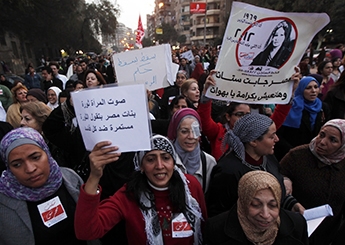On February 11 2013, the second anniversary of President Mubarak’s resignation, the chants for “bread, freedom and social justice” still fill the air, as once again protesters in Egypt take to the streets. The protests, which have been somewhat more violent this past year, indicate there is still a great deal of dissatisfaction in the country.
(CJFE/IFEX) – 11 February 2013 – Two years ago, demonstrations in Egypt brought thousands of people to Tahrir Square in demands of “bread, freedom and social justice.” An early part of the “Arab Spring,” the protests were successful in forcing President Mubarak to step down, bringing after his nearly 30 years of rule to end in a matter of weeks.
But on February 11, the second anniversary of President Mubarak’s resignation, the chants for “bread, freedom and social justice” still fill the air, as once again protesters in Egypt take to the streets. The protests, which have been somewhat more violent this past year, indicate there is still a great deal of dissatisfaction in the country.
Clifford Orwin, a Political Science professor at the University of Toronto, writing for The Globe and Mail in February 2011, alluded to the problems Egypt would face post-revolution. Now speaking with CJFE two years later, Orwin discusses the present and future of Egypt. Although he agrees that the revolution was a possible first step in moving towards democracy and free expression, Orwin notes that it does not by any means guarantee that they will follow. He points out that although it was not possible to predict what would happen, it was likely that if Mubarak stepped down, his regime would be replaced by an Islamist government. “That I think was fully predictable at that time, and that was one reason why a number of secular, liberal intellectuals, despite the euphoria of Tahrir Square, regarded the revolution with some apprehension.”
Orwin also maintains that the lack of press freedom in Egypt stems from the fact that it has no tradition in the country. He implies that given the dire economic situation in the country, the demand for press freedom is not a priority for most Egyptians. He explains that many Egyptians are looking for order in the country, be it in the form of religious law or economic progress.
“That being the case, I think there is a certain impatience with critics as troublemakers. If you’re a critic of the Islamist regime, you’re not likely to get a lot of thanks for that, either because the constituency favours the Islamist regime or because the constituency favours that you don’t rock the boat…That’s why it’s going to be an uphill struggle for press freedom in Egypt.”
When Mubarak’s dictatorship ended, it was quickly replaced by an Islamist regime with the election of President Mohammed Morsi. Initially, the revolution seemed to bring about a new hope for journalists and free expression, but this hope quickly dissipated with the new constitution brought in by Morsi’s government, clearly no friend to free speech. Several provisions, including the addition of criminal defamation, place increased restrictions on free expression. In an article published by IFEX, the Arabic Network for Human Rights Information reported that Morsi’s “first 200 days in office alone have witnessed more defamation lawsuits than under all Egyptian rulers combined since 1892.”
However, CJFE’s 2011 International Press Freedom Award Winner, Mohamed Abdelfattah, is hopeful. He maintains that media has seen progress thanks to the revolution. He says “the Mubarakist legal framework that stifles free expression might be there unreformed, but an empowered citizenry is no longer intimidated.”
The struggles for press freedom have not lessened since Morsi’s election. Farida Makar, a researcher at the Cairo Institute for Human Rights Studies, cites numerous examples. “Journalists and media personalities have been accused of defaming the president and of insulting the judiciary. Cases have been filed against them. Television channels have been closed down and some journalists have received death threats.”
According to Makar, there has not been a reform in the government, although she agrees with Abdelfattah’s view that the people have been empowered. She believes that the younger generation will continue to fight. She admits that some were skeptical that democratic forces would maintain strength and create a movement as strong as it initially was, but the protests this year have proven the opposite. “It is possible to mobilize large numbers of people two years after the uprising. As long as this happens, I think there is still hope, though the challenges grow stronger as time goes by.”
Reflecting back on the past two years, one can clearly see that much has changed, and yet many of the same problems remain. “I can’t say that I’m optimistic about the so-called Arab Spring, I’m not, because it may lead to regimes that were worse than the ones that preceded it,” Orwin explains honestly, “but if there were to be regimes better than those that preceded it then you would have needed something like the Arab Spring to introduce them.”
February 11, 2013, marks the second anniversary of President Mubarak’s resignation. The optimism of those first weeks of protests may have ended, but the demand for reform and greater freedom has not diminished. The continued struggles by Egyptians for change offer the main sign of hope that Egypt will one day see protection of human rights including free expression for their country.



